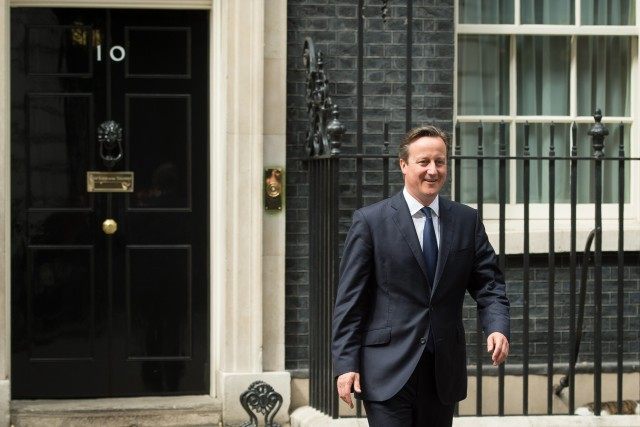British Prime Minister David Cameron is set to call the In/Out referendum on Britain’s European Union membership in June 2016, using his keynote address to the annual Conservative Party Conference this October to announce the fast-tracked date.
Although 10 Downing Street has refused to comment further The Independent on Sunday reports their source insisted that fast-tracking the vote to June 2016, including the bill needed to approve that, would not be blocked by Parliament. The election manifesto and the Queen’s Speech promised the EU membership referendum “before the end of 2017”, the House of Lords would be unlikely to block any necessary legislation under those circumstances.
Chancellor George Osborne was understood to be keen for the referendum to be held later rather than sooner, believing that maximised the chances of securing the best possible deal. Cameron disagrees. He calculates a 2016 vote gives him a better chance both of promoting what will likely end up being only a very limited package of European reforms, and of highlighting what he sees as the economic risks of leaving the EU.
The timing is also said to favour other member states, as a June 2016 date would prevent Britain’s reform demands becoming a divisive political issue in the French presidential and German federal elections, both held in 2017.
The ongoing crisis in Greece and EU member states’ huge efforts to hold Greece both in the euro and inside the EU have also been cited as being “influential” over the fast-tracked date. The EU’s apparent reluctance to countenance a member state even as troublesome as Greece leaving the project has apparently encouraged British government leaders to believe they’ll get the reforms they are after.
That being said, senior sources told the Independent on Sunday the Prime Minister now accepts there is only a limited chance of any changes to EU governing rules contained in the Lisbon treaty. This contradicts Cameron’s previously stated position, as reported by The Telegraph, when he said that the changes he wants to see “do involve treaty change, and proper, full-on treaty change.”
Cameron’s previously understood wishlist for European reform included an opt-out from “ever closer union”, changes to in-work benefits for EU migrants and an easing of the way Brussels enforces EU legislation on member-state parliaments. At least two of those wishes requires some form of treaty change.
The Prime Minister’s advisers are telling him he could re-use the so-called unionist “vow” rolled out just before last year’s Scottish referendum. In a move which was seen by many as a cynical last-ditch attempt to swing a referendum which the government risked losing, Scots voters were promised their reform package provided they voted in favour of staying in the United Kingdom.
Using this approach Cameron would try to convince British voters Europe will, if there is a vote to retain EU membership, honour reforms and exemptions negotiated by the government even if there is no actual treaty change or other concrete action before the referendum.

COMMENTS
Please let us know if you're having issues with commenting.